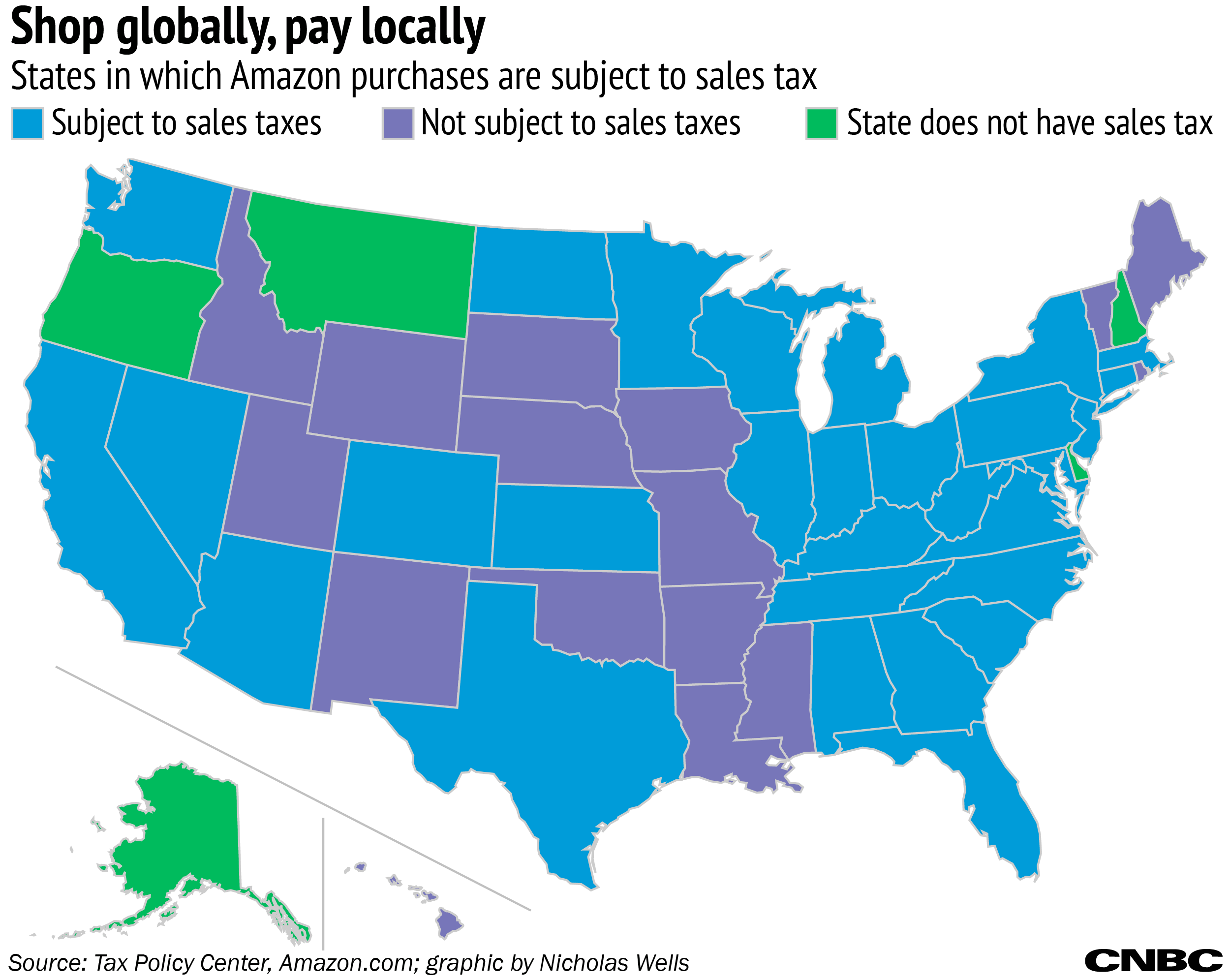
SUPREME COURT RULES THAT STATES
CAN FORCE ONLINE RETAILERS
TO CHARGE SALES TAX
SEE: https://www.thenewamerican.com/economy/economics/item/29340-supreme-court-rules-that-states-can-force-online-retailers-to-charge-sales-tax; republished below in full unedited for informational, educational and research purposes:
States may soon impose sales taxes on residents who shop online, according to a decision handed down by the Supreme Court on June 21.
The Associated Press (AP), citing a statement made by an attorney associated with the case, reported that “consumers can expect to see sales tax charged on more online purchases — likely over the next year and potentially before the Christmas shopping season — as states and retailers react to the court’s decision.”
In a split 5-4 decision, the justices overturned prior rulings issued by lower courts that exempted a variety of online commerce from being subject to sales tax.
The previous prohibition cost states billions in revenue that would otherwise have been imposed on people purchasing goods over the Internet. Evidence of the cost of the courts’ earlier decisions is the fact that more than 40 states joined in the petition seeking relief from the Supreme Court.
The distinction between when a state could collect sales tax at the time of the online purchase and when it had to use its own resources to collect the fees after the transaction is explained in the AP story.
Prior to the court’s June 21 decision in South Dakota v. Wayfair, “If a business was shipping a customer’s purchase to a state where the business didn’t have a physical presence such as a warehouse or office, the business didn’t have to collect sales tax for the state. Customers were generally responsible for paying the sales tax to the state themselves if they weren’t charged it, but most didn’t realize they owed it and few paid.”
And: “Until now, many sellers that have a physical presence in only a single state or a few states have been able to avoid charging sales taxes when they ship to addresses outside those states.”
Not anymore. Now, states can force online retailers to charge sales tax on all their customers, regardless of the company’s physical presence in the purchaser’s state of residence.
Joined by Justices Clarence Thomas, Ruth Bader Ginsburg, Samuel Alito, and Neil Gorsuch, Justice Anthony Kennedy wrote, “Each year the physical presence rule becomes further removed from economic reality and results in significant revenue losses to the States.”
Following this decision, states are no longer prevented from passing state laws requiring online retailers without a physical presence in their states to charge sales tax at the time of the sale and to have those funds forwarded by the sellers to the states.
Chief Justice John Roberts sided with Justices Stephen Breyer, Elena Kagan, and Sonia Sotomayor in dissenting from the ruling, coming down in favor of maintaining the sales tax status quo. “E-commerce has grown into a significant and vibrant part of our national economy against the backdrop of established rules, including the physical-presence rule. Any alteration to those rules with the potential to disrupt the development of such a critical segment of the economy should be undertaken by Congress,” the minority opinion reads.
President Trump expressed his hopes that all states would get the green light to use Amazon and other online retailers as surrogate revenue collectors. “Big victory for fairness and for our country” and “Great victory for consumers and retailers,” the president tweeted in 2017.
In an article published by the American Institute for Economic Research, Jose Niño exposed the economic fallacies underlying the belief that allowing all states to force retailers to charge sales tax to all consumers was a good idea. Niño explains:
Unbeknownst to many pro-tax politicians, tax hikes not only hurt the businesses themselves through lagging production, they also hurt consumers as companies pass the costs onto consumers via higher prices on goods and services.
Most of the states that have clamored for the closing of loopholes are characterized by their already byzantine tax systems and unsustainable spending programs. Art Laffer of Laffer Curve fame has demonstrated that raising taxes does not necessarily lead to increased tax revenue.
With labor and capital being more mobile than ever, raising taxes or even adding more forms of taxation can have a contractionary effect on state budgets and economies. In effect, many businesses must seek greener pastures in low-tax jurisdictions, thus denying their home state potential tax revenue and possibly exacerbating budget deficits.
This type of dynamic ensures tax competition among states, which is optimal for taxpayers. Pro-tax politicians obviously despise tax completion because it creates a “race to the bottom” of sorts that incentivizes state governments to keep taxes low. In turn, this creates a climate of fiscal discipline where states must respect the ability of taxpayers to shift economic activity to friendlier tax districts.
In the same vein, overspending does not give state governments a blank check to raise taxes wherever they want. Most of the spending problems that certain states face is due to the government’s overreach in many sectors of the economy such as education, healthcare, and transportation. Instead, these sectors would be better served through privatization and other cost-cutting measures.
States already possess the power to tax Internet sales, on firms actually present in their states. Given the dismal track record of the current federal tax system, a federal solution to sales tax issues will only further complicate matters.
Ultimately, American consumers will once again be forced to shoulder the cost of this opinion, by paying more for goods so that already profligate state governments can continue growing and growing, wasting dollar after dollar, piling bureaucracy upon bureaucracy and regulation upon regulation, seemingly without pausing to ponder what will happen on that fateful day when Atlas finally shrugs.
_____________________________________________________________